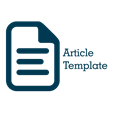Zero Waste Production Coconut Charcoal Syam Saputro Kudus with Lean Manufacturing Implementation
DOI:
https://doi.org/10.18196/st.v28i1.25051Keywords:
lean manufacturing, coconut charcoal, cost-vsmAbstract
Export demand for coconut charcoal always increases from year to year. According to data from the Badan Pusat Statistik (BPS), the export value of coconut charcoal rose by 4.69%, increase from USD 145.1 million in 2019 to USD 151.9 million in 2020. Indonesia exported 188,050 tons of coconut charcoal, with the export value totaling USD 145.09 million. So, this requires producers to be able to meet export demand. Syam Saputro Kudus is a producer of coconut charcoal which is exported to various countries. The production capacity of this charcoal factory is approximately 240 tons per month. From this production capacity, Syam Saputro Kudus has set a production target of 200 tons per month. Unfortunately, from existing data it is found that the company has not been able to meet the production target. Failure to achieve production targets was caused by transportation, inventory, deffect and over processing problems. This is a fundamental problem for a producer in meeting production targets. This study aims to apply lean manufacturing through the use of Cost-Based Value Stream Mapping (Cost-VSM) method, so that it can be a solution for Syam Saputro Kudus in meeting production targets. Meanwhile, the expected outcome of this research is the creation of a future VSM model which can be used as a reference for entrepreneurs in minimizing non-value-added activities so as to achieve efficiency to increase productivity.
References
Alves e Silva, S., Venturini, O. J., Leme, M. M. V., de Moura, D. C., & de Oliveira Heck, T. (2024). Enhancing sustainability in charcoal production: Integrated Life Cycle Assessment and by-product utilization to promote circular systems and minimize energy loss. Biomass and Bioenergy, 182(February). https://doi.org/10.1016/j.biombioe.2024.107115
Asmal, I., Walenna, M. A., Nas, W., & Ridwan. (2023). Application of local wisdom in handling waste in coastal settlements as an effort to minimize waste production. Environmental and Sustainability Indicators, 19(July), 100283. https://doi.org/10.1016/j.indic.2023.100283
Bernhard, O., Dillinger, F., & Zäh, M. (2023). Methodology for Transformation Processes in the Context of Lean 4.0 in Manufacturing Companies. Procedia CIRP, 120, 487–492. https://doi.org/10.1016/j.procir.2023.09.024
Costa, F., Alemsan, N., Bilancia, A., Tortorella, G. L., & Portioli Staudacher, A. (2024). Integrating industry 4.0 and lean manufacturing for a sustainable green transition: A comprehensive model. Journal of Cleaner Production, 465(November 2023), 142728. https://doi.org/10.1016/j.jclepro.2024.142728
Dinesh, S. N., Shalini, M., Vijay, M., Vijey Mohan, R. C., Saminathan, R., & Subbiah, R. (2022). Improving the productivity in carton manufacturing industry using value stream mapping (VSM). Materials Today: Proceedings, 66, 1221–1227. https://doi.org/10.1016/j.matpr.2022.05.015
Ditjenbun, “Statistik Perkebunan Unggulan Nasional 2019-2021,” Direktorat Jendral Perkeb. Kementeri. Pertan. Republik Indones., pp. 1–88, 2021, [Online]. Available: https://ditjenbun.pertanian.go.id/template/uploads/2021/04/BUKU-STATISTIK-PERKEBUNAN-2019-2021-OK.pdf
Hizam, A. S., Mohamed, N., & Nelfiyanti. (2024). Study of SME employees’ awareness level on lean manufacturing and ergonomics implementation in Malaysian and Indonesian production environments. Heliyon, 10(18), e38216. https://doi.org/10.1016/j.heliyon.2024.e38216
Kundgol, S., Petkar, P., & Gaitonde, V. N. (2019). Implementation of value stream mapping (VSM) upgrading process and productivity in aerospace manufacturing industry. Materials Today: Proceedings, 46, 4640–4646. https://doi.org/10.1016/j.matpr.2020.10.282
Magnus, C. S., & Venschott, M. (2024). ScienceDirect Towards a GPT-Based Lean Manufacturing Consultant for Manufacturing Optimization. Procedia CIRP, 130, 167–176. https://doi.org/10.1016/j.procir.2024.10.072
Mohan Prasad, M., Dhiyaneswari, J. M., Ridzwanul Jamaan, J., Mythreyan, S., & Sutharsan, S. M. (2020). A framework for lean manufacturing implementation in Indian textile industry. Materials Today: Proceedings, 33, 2986–2995. https://doi.org/10.1016/j.matpr.2020.02.979
Ossei-Bremang, R. N., Adjei, E. A., & Kemausuor, F. (2023). Multivariate decisions: Modelling waste-based charcoal briquette formulation process. Bioresource Technology Reports, 22(May), 101483. https://doi.org/10.1016/j.biteb.2023.101483
Rahima Shabeen, S., & Aravind Krishnan, K. (2022). Application of lean manufacturing using value stream mapping (VSM) in precast component manufacturing: A case study. Materials Today: Proceedings, 65, 1105–1111. https://doi.org/10.1016/j.matpr.2022.04.159
Spirio, A., Arrigo, R., Frache, A., Tuccinardi, L., & Tuffi, R. (2024). Plastic waste recycling in additive manufacturing: Recovery of polypropylene from WEEE for the production of 3D printing filaments. Journal of Environmental Chemical Engineering, 12(3), 112474. https://doi.org/10.1016/j.jece.2024.112474
Utama, D. M., & Abirfatin, M. (2023). Sustainable Lean Six-sigma: A new framework for improve sustainable manufacturing performance. Cleaner Engineering and Technology, 17(June), 100700. https://doi.org/10.1016/j.clet.2023.100700
W. Kosasih, C. O. Doaly, and Shabara, “Reducing Waste in Manufacturing Industry using Cost Integrated Value Stream Mapping Approach,” IOP Conf. Ser. Mater. Sci. Eng., vol. 847, no. 1, 2020, doi: 10.1088/1757-899X/847/1/012061.
Wiese, M., Rogall, C., Henningsen, N., Herrmann, C., & Thiede, S. (2022). Environmental and technical evaluation of additive manufacturing: Enabling process chain perspective by energy value stream mapping. Procedia CIRP, 105(March), 440–445. https://doi.org/10.1016/j.procir.2022.02.073
Downloads
Published
How to Cite
Issue
Section
License
Copyright (c) 2025 Hanin Fitria, Nunung Agus Firmansyah, Mu'aida Wijayanti, Ahmad Saefulhadi

This work is licensed under a Creative Commons Attribution 4.0 International License.
Semesta Teknika is licensed under a Creative Commons Attribution 4.0 International License.
Authors who publish with this journal agree to the following terms:
- Authors retain copyright and grant the journal right of first publication with the work simultaneously licensed under a Creative Commons Attribution License that allows others to share the work with an acknowledgement of the work's authorship and initial publication in this journal.
- Authors are able to enter into separate, additional contractual arrangements for the non-exclusive distribution of the journal's published version of the work (e.g., post it to an institutional repository or publish it in a book), with an acknowledgement of its initial publication in this journal.
- Authors are permitted and encouraged to post their work online (e.g., in institutional repositories or on their website) prior to and during the submission process, as it can lead to productive exchanges, as well as earlier and greater citation of published work (See The Effect of Open Access).








